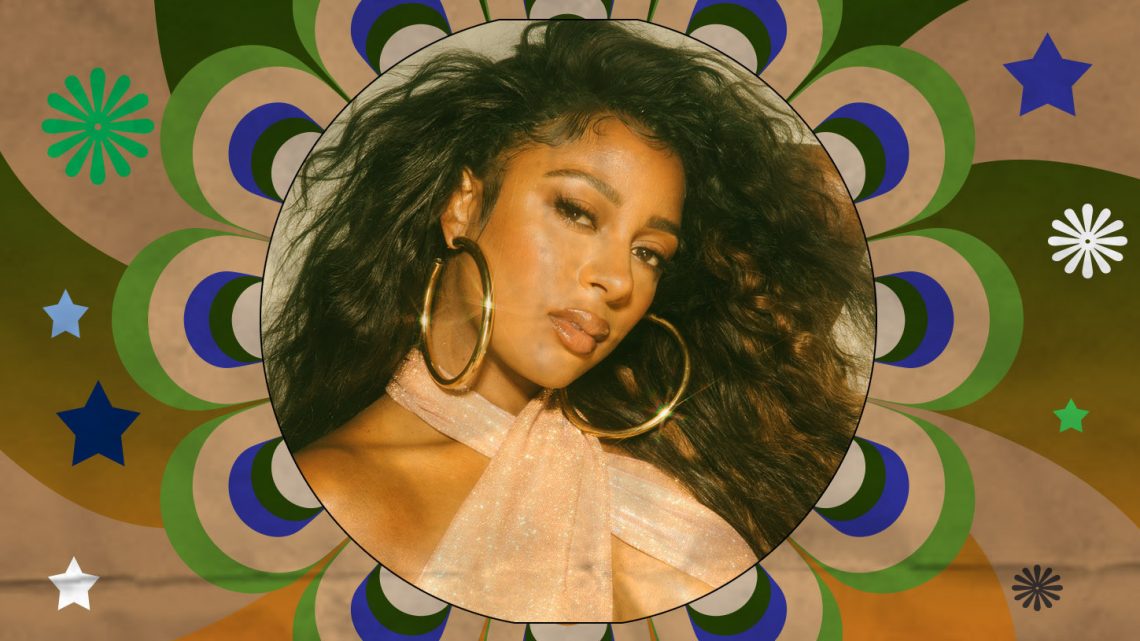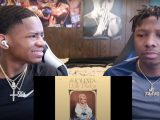
Victoria Monét Was R&B’s Best Kept Secret—Until Now
August 7, 2020Victoria Monét has the kind of voice that makes you pay attention. She's gentle when she speaks, which only draws you in closer, for fear of missing a word. Her songs are similarly engrossing, combining the vulnerability of Janet Jackson, the swagger of Donna Summer, and the cutting honesty of Destiny's Child. It's no wonder the Sacramento native, who got her start in a short-lived girl group, has become a go-to songwriter for some of pop and R&B's biggest acts.
Monét has an unbelievable knack for writing songs that become cultural moments. Last year, she co-wrote half the songs on thank u, next, Ariana Grande's R&B-leaning masterwork that memorialized the breakup felt around the world. (The album earned her Grammy nominations for Record and Album of the Year.) This year, she penned "Rather Be," the highly anticipated, misty-eyed lead single for last month's B7, Brandy's first album since 2012. Now, with her solo project, Jaguar —two years in the making—she's poised to become a cultural moment unto herself, weaving 70s orchestral funk and the slow grooves of 90s R&B into a work that cements her status as one of contemporary R&B's defining architects.
"Jaguars are always there, but sometimes you just don't see them," she said, explaining the choice of title to me over lunch in February. "I've been in the music industry for a long time, but behind-the-scenes. Now feels like my moment to be the aggressor and get what I want."
When we meet, she's more down-to-earth than you'd expect someone who considers Grande a "soul-friend" to be. When Monét finds a hair in her food during our interview, she doesn't lash out or throw a fit. Instead, she politely sends her plate back and asks, "Is this good luck?"
A lot has changed since we met. As a result of COVID-19, the music industry is taking a financial hit because of the uncertain future of live shows, pivoting to virtual ones without any clear indication of when touring musicians can expect to perform again. It's also dealing with an overdue reckoning following the senseless murders of unarmed Black Americans, due to the silence from major labels and gatekeepers alike despite the industry's systemic exploitation of Black artists. Though the album was initially slated for a March release, she decided to push it back. The world pausing provided a unique opportunity for the singer to step back and assess two things: Was this the right time to release Jaguar, and was the final version as good as it could get? As a result of her extra moment to reflect, some songs were scrapped altogether and saved for future projects.
Just when she settled on a new date, July 31, Beyoncé announced she'd be releasing her new visual album Black Is King on the same day. As a self-proclaimed member of the Beyhive, Monét knew what she had to do. "Out of all the days of the year when the Queen drops, it's not your day," she tells me on a follow-up call in late July, weeks ahead of the project's revised release date: August 7.
Five months into quarantine, she's still hopeful for the rollout she imagined, clinging to the best and worst parts of her old life, just like the rest of us. Still, she says that even that errant strand of hair sounds appetizing to her after months in lockdown, a time during which she grappled with whether releasing Jaguar would be insensitive given the social climate.
"I was trying to support in different ways, but also realizing that me being a person that is a Black business, putting out music can be a form of protest and resistance when people want to silence you," she says. "I thought, How else could I be of service and using the gift that God gave me to push things forward and let people have a form of escapism through music?"
An homage of sorts to the soul music of the 70s, the project is a rumination on survival and self-preservation. With the jaguar motif, Monét isn't trying to paint herself as a bloodthirsty predator of the jungle. Instead, it's an allegory for her career path—one in which her successes as a behind-the-scenes songwriter caused her to retreat to a more subdued role, hiding in plain sight. "I don't want to paint this perfect picture where a jaguar is a person who is confident and gets everything they want. In the hunting world, a lot of times, you're not eating. It's not 100 percent kill every time."
Monét's path to this moment has been a winding one, a story of bouncing back and correcting course after several detours and false starts. As a teenager in Sacramento, she immersed herself in dance classes, hoping the city's burgeoning hip-hop dance scene would make her a star. As she tells it, she eventually started setting her poems to music and producing them in a friend's bedroom. Like many budding creatives with internet access in the aughts, she started uploading them to MySpace, leading her straight to the inbox of Rodney "Darkchild" Jerkins. Through his work with Brandy, TLC, and Britney Spears, the legendary producer was one of the driving forces of the pop and R&B landscape of the late 90s and early 2000s. It felt like her big break.
Jerkins invited her to audition for Purple Reign, a girl group he was starting under Motown Records. After successfully auditioning, Monét headed south to Los Angeles with the promise of a record deal for the new R&B trio. Although the group recorded 21 songs for their debut album, the label dropped the group before the record was ever released—though their covers of Destiny's Child, another one of Jerkin's success stories, still live on YouTube.
"I was heartbroken, and I was struggling," she says of suddenly finding herself jobless in L.A. "Leaving your family to do this big venture, everyone's so proud. It's like, Oh, you're going to sign to Motown. It has to work. With such a great producer who has so much experience, there's no reason why it shouldn't." Monét knew if she told her parents the whole truth, they'd expect her to return to Sacramento. Feeling rejected and embarrassed, she started turning once more to songwriting, hoping it would help her process her feelings.
"It was a grey area of not knowing what's next, but fighting to make things happen for me," she says.
Purple Reign might not have been a success, but Monét's time in the group introduced her to producers who would end up playing an integral role in her career. While they were recording their debut album, without much money or a place to stay, the group had spent some time crashing with Los Angeles-based producer D'Mile, who was working with Janet Jackson and Dirty Money at the time, along with a handful of up-and-coming songwriters like Ariana Grande collaborator Tommy Brown. Though a solo career seemed like the furthest thing from her reality back then, Monét knew she wanted to work with D'Mile on her music one day. Little did she know it, but Jaguar would bring her dream full circle.
She set about trying to find work where she could, landing her first songwriting credit on "I Hate That You Love Me," a cut from Diddy and Dirty Money's 2010 album, Last Train to Paris, and singing on hooks for prolific rappers like Nas and T.I. By 2013, she'd discovered a more permanent writing partner in a former Nickelodeon star with a big voice: Ariana Grande. Together, they crafted Yours Truly, Grande's debut album, and they've been collaborating ever since. Though she released a series of solo singles and EPs during this period—including 2018's Life After Love, a two-part saga about nursing a broken heart—she continued writing songs for others she was never going to sing herself.
Toward the end of 2018, she decided to take a break from co-writing for other artists in order to pour herself into her next project: her first definitive statement as a solo artist. She approached D'Mile to see if he might like to produce it, knowing that he shared her fondness for live instrumentation.
"I went to D'Mile and was feeling Earth, Wind, and Fire," she says. "I wanted music you'd play in a smoky bedroom or at a family reunion." Eventually, they landed on a sound that drew on their mutual love of the Jacksons, combining the iconic 70s harmonies of the Jackson 5 with Janet's R&B maturation in the 90s.
Though Jaguar isn't Monét's first solo project, its nine tracks represent the most cohesive and elevated version of her sound, which she credits to working consistently with one producer for the first time. Its grooves swallow you like bell bottoms, juxtaposing her soft voice against boisterous horns and deep basslines. And unlike the songs she's written for other artists to sing, she seems to be speaking her own language. "Life is but a dream that you manifested slowly, so fuck a fantasy / This your motherfucking moment," she sings on "Moment," the record's sprawling opener.
In a world of fast music and even faster consumption, Jaguar is a slow burn that feels like a lesson that many of us are learning in quarantine: the importance of taking one's time. On "Moment," the production lingers on each juncture, as do her vocals, which makes the first three minutes of the project feel extremely intimate. With each verse, the instrumental arrangements provide more depth than the last, and by the end, you're in the thick of a lush string section. For Monét, whose solo career reads less like a beeline than a drive on the scenic route, there is pleasure in the road less traveled.
Jaguar is also a treasure trove of elegant sexual innuendos. Often, she dresses up her dirty talk in pretty metaphors, such as on "Moment," when you realize that the phrase "Land it like a plane on my back if you can't hold it" isn't exactly air traffic jargon. Likewise, it can take you a few beats to notice the bed-spring squeaks in "On Dive," recalling Lil Scrappy and Trillville's 2004 smash "Some Cut"—even if at other points in the song, she expresses her desires in layman's terms: "I wanna see if your head game right / Do you know what you're doing?" Still, the most explicit and fearless song on the record is surely "Touch Me," a delicate slow jam with Janet Jackson-inspired harmonies, about being intimate with a woman.
Monét, who identifies as bisexual, describes her approach to these themes as "expressive and sexual, but not too on-the-nose." She's no stranger to the ways society tend to oversexualizes Black women, queer folks, and those, like her, who fall in the intersections of those communities—so she says it took her some time to feel comfortable with exploring the nuances of her sexuality in song.
"It started with honesty and letting down the curtains of the mystique and trying to uphold a politically correct view of what felt safe for radio," she says. "I wanted to fight through being creatively free and represent feelings I'm having more accurately. I often take the longer, honest route, and I'm fine with that."
Gym anthem "Ass Like That" is a catchy testament to that patient, slow-going approach. In an era of instant gratification, cosmetic surgery, and FaceTune, it's a song about earning the body you want—irrespective of how others see you. "When you see me, just know / That I earned that shit / Treat my calories like weed, yeah, I burned that shit," she sings.
Like "Ass Like That," Jaguar is a story of perseverance. The project's 70s influence is no coincidence: It's a tribute to the music her grandparents introduced to her, music that was created despite and in the name of political upheaval—a choice that feels especially timely amid yet another period of civil unrest. Its production feels like the heartbeat that soundtracked Marvin Gaye's "What's Going On?," Shirley Chisholm's historic run as the first Black candidate for U.S. president, and the height of the Black Panthers, a political movement that challenged police brutality in much the same way that Black Lives Matter is doing now. And like Monét herself, its symbol was a fierce, black jungle cat—a symbol of strength in the face of adversity.
"I'm learning how to ask for help, take more action, and speak up," she says. "I've operated by working really, really hard hoping that someone would see that and validate that, but now I'm just like, jaguar season."
Kristin Corry is a Senior Staff Writer for VICE.


